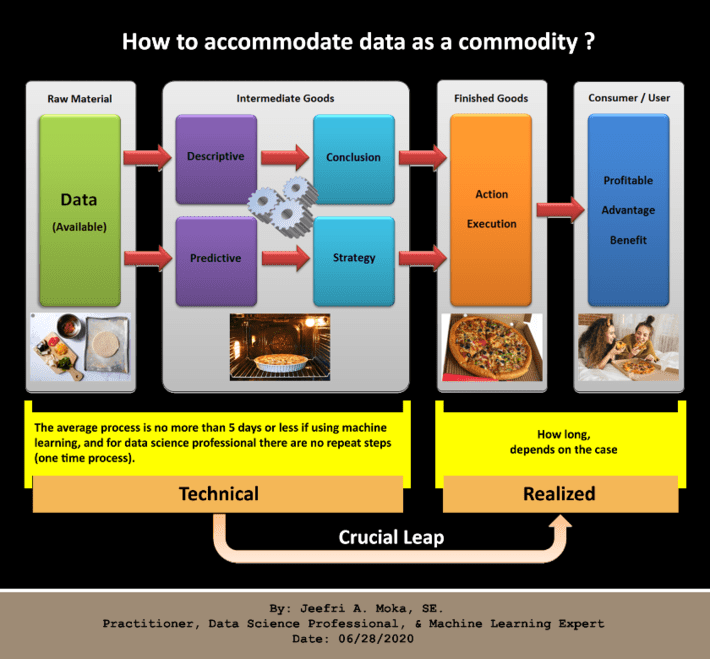What is a commodity?
Commodity are basic raw materials with certain standards that are used with other goods, commodity are often the basis of the production of various finished goods or services and then referred to as commodities (something made based on commodity). Some examples of commodity are seen from their types: metal (gold, silver, platinum, and copper); energy (crude oil and natural gas); livestock and agriculture (beef, mutton, rice, wheat, corn, soybeans, chocolate, coffee, sugar); and others.
Data like a commodity
There are several related terms about data:
- ‘Data is oil in the digital age.’
- ‘Data as the fuel of the future.’
- ‘Data is new oil, even more valuable than oil.’
- ‘That the most valuable resource in the world is no longer oil, but data.’
- ‘Decisions made are not based on data, only assumptions.’
From some of the terms above, it can indeed be said that data is a new commodity because in the current digital era data has been juxtaposed or compared with oil. One example that data has a very high economic value is where large technology companies based social media has acquired at a very high price, a startup that only employs less than 100 people. I mean, data that the startup has owned is a valuable asset where data has increased the sale value of a company, so may I say that data has improved goodwill (invisible assets) despite an understanding that the large company wants to eliminate potential competitors (case: Facebook acquired WhatsApp in 2014 at a price of US$ 22 billion).
How to accommodate data as a commodity?
If the data is a commodity or may I say as raw material, then data must be processed to be able to provide benefits or advantage, as well as raw materials that must be processed first to become finished goods that can be enjoyed by consumers. For more details, you can consider the following schema:

The schematic image above is the stages that must be understood to be able to apply what is meant by data as a commodity. It was explained that data as raw material which subsequently undergoes a certain process to be able to become finished goods (in this case in the form of action or execution) which ultimately can provide benefits to users (government, companies, etc.), raw materials (data) cannot be separated itself to directly become finished goods without any prior process (intermediate goods), which means that all stages are one unit.
As an understanding, If your company has a number of data (buy from other parties or dig it yourself through surveys, etc.). Then ask the following basic things:
- What are the benefits of the data for the company?
- What processes can be carried out to achieve these benefits?
- What action or execution by the company to achieve these benefits?
- How long will it take to achieve these benefits?
- Are the benefits obtained as expected?
But there are some things that need and are important to note, if you look at the schemes at the bottom where there is a crucial leap in the technical aspects towards aspects of realization, it means technical becomes an important aspect before you jump to realize because when you have realized it is difficult to return to the technical aspects, or technical error resulting in the realization does not occur optimally, it is necessary for the user to really make a proper consideration technically.
In my opinion, until now the government, companies (even large companies) have still not been able to implement or make data as a commodity maximally. Through this article, hopefully you have a little understanding of what is meant by data as a commodity.
I hope this article can be useful for you.
Thank you
